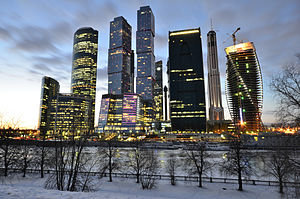Putin's approval ratings have hovered north of 80% in the wake of Russia's annexation of Crimea, and has galvanized support for a more strong and assertive foreign policy. Many analysts have remarked on how Putin has managed to grab the West by the balls, embarrassing the Obama administration by blatantly disregarding them on every issue from Syria to Iran. Further, Europe's dependence on Russia for gas has crippled any possible sanctions regime for the short term at the very least. In fact, "
Russification"of the Crimean peninsula went ahead with much fanfare earlier this week, drawing a rather tepid response from the international community.
It's easy to imagine that there's a pretty euphoric atmosphere in the Kremlin right about now, and that probably is the case considering that they managed to pull of the annexation of a sovereign territory in the 21st Century without triggering a military response. But it should not be, for the whole drama over the Crimea has only served to distract Kremlin functionaries from the grim realities that Russia faces from the near to long term.
 |
| The median age is buoyed by the 20-35 demographic |
Ever since the collapse of the Soviet Union, demographics have not been Russia's friend. Its population peaked in 1991, and for the next decade saw rapid population decline as emigration, poor healthcare and violence in periphery regions took their toll. Since then Russia's population has stabilized, and recently even experienced a net increase. Even so, in coming years Russia will grapple with the same issues that Western countries will face in coming years, exacerbated by large scale emigration as well as poor healthcare and elevated poverty levels compared to the West. While birth rates have recovered somewhat over the past decade, the median age in the country is 39.4, compared to 29.9 in Kazakhstan. Already possessing an aging population this is set to worsen due to emigration, especially amongst young people in the country. Economic collapse in the 1990s saw emigration surge, especially to western European countries such as Germany and the UK, as well as other countries such as Israel. A rapid increase in the average Russian income slowed the pace of emigration, and immigration from former Soviet states for the most part offset it. The numbers are deceiving however. In a poll conducted last year, nearly half of Russian students indicated a desire to leave the country, citing lack of economic opportunity and disillusionment with the political establishment. Comparatively, the overwhelming majority of migrants that come from the former Soviet bloc are labourers who lack the academic background of the highly coveted migrants who are currently leaving Russia in droves.
 |
| Increasingly iced out, young Russians are looking abroad |
The emigration of the intellectual elite is nothing new to the country, with many prominent Russian liberals such as Sergei Guriyev and Garry Kasparov living in self imposed exile abroad. What's different this time around are the numbers, having dramatically increased in recent years. In fact, 2013 saw a 76% increase in political asylum requests compared to 2012, a meteoric rise that should it prove to be more than a statistical anomaly, could have dire consequences for the Russian economy. The effects of the impending demographic "crash" that many countries have been well documented by academia. Countries such as Canada, the U.S and large swathes of Europe as well as Japan all grapple with the issue of caring for an increasingly old population while drawing from a constantly shrinking tax base. Russia, along with Japan is one of the few countries in the world that will most likely face a simultaneously shrinking and aging population, something that countries such as Canada have successfully countered by encouraging students, businessmen and young professionals from around the world (but predominantly Asia) to immigrate.
 |
| The economy is controlled by Oligarchs |
Now while the population might marginally decline, but is that the only trend with long term implications for Russia and this supposed decline? On the surface, Russia's economy actually looks pretty solid. Unemployment hovers around 5%, foreign debt is relatively low and the recession for the most part left Russia unscathed. In fact, some might be surprised to know that the United States has a greater percentage of their population living under the poverty line (14.8%) compared to Russia (11.2%). But this is somewhat of a Potemkin Village, for the Russian economy's structure is fundamentally different from the capitalistic liberal democracies of the west. When the Soviet Union collapsed, the cash-strapped Russian state instituted a controversial "Loan for Shares" program that ended up transferring control of SOEs (State Operated Enterprises) from the Russian government to shady nouveau-riche types, often with links to organized crime, who came out of seemingly nowhere to purchase heavily undervalued government assets at bargain basement prices. Having paid marginal prices to acquire large swathes of Russian industry, this exclusive club of billionaires forged close ties with the Kremlin and through graft and corruption wrested control of the economy from the fledgling free market forces that were just gaining traction in the country. As a result, Russia is now home to the greatest number of billionaires in the world. While much noise has been made in the media about the close links between these robber barons and many top politicians, they're not exactly the patriotic type.
Capital flight has plagued the Russian state almost from its inception, with most wealthy Russians stashing their wealth abroad. One only has to drive through London's most exclusive boroughs need to see
the "Iceberg Homes" that many of Russia's ultra-wealthy have erected. The Crimean invasion caused a spike in capital flight abroad, from $8 billion a month to roughly $70 billion during the first three months of the year. As a result, the Russian economy is especially sensitive to shifts in the global economy geopolitical shocks, and why the continued decline of the ruble has many economists worried, despite the obvious boon it would be for Russia's large export based economy. The large scale investments that Putin has unveiled to modernize the military, improve infrastructure and revitalize the economy are already taxing the Kremlin treasury, and a chronic decline in the value of the ruble does not bode well for a Russian economy that remains under the threat of sanctions.
What's important to consider is that Russia can be cursorily described as a hybrid petro-state and nuclear power, relying on revenues from oil exports to pay for the large (and often corruption riddled) "megaprojects" that have become a hallmark of Russian economic policy in recent years. It is the largest exporter of oil in the world, and possesses its largest proven natural gas deposits. While the financial and industrial sectors have sputtered, resource extraction has taken off, providing enough hard currency that allows Russia to maintain an
exceptionally low debt as a percentage of the GDP, especially when compared to the U.K (88.7%). Exporting upwards of 10 million barrels a day, mostly to the rest of Europe, also means that Putin could bring his rivals to the west to their knees with a turn of the spigot, and as a result has been granted an unusual degree of latitude in his geopolitical maneuverings. But the leverage over his enemies that Putin enjoys may not last. Many experts predict that an increase in overall production coupled with slowing growth in demand and lower extraction costs will lead to a long term decrease in the cost of oil. Iraq has added 1 million barrels of production since 2007 and that number
is expected to increase. In response to the Crimean crisis, the United Kingdom had organized meetings seeking to wean Europe off of Russian oil and natural gas. Compounding this, between 1995 and 2005, spending on renewable energy sources (excluding large scale hydro) grew from $10 billion to $30 billion, and that number is only expected to increase as countries increasingly seek clean and sustainable alternatives to pricey fossil fuels. Some economists disagree that this will put a damper on oil prices however, arguing that in response to lower prices some producers will cut back on production and shelve expansion plans, repeating the cycle of increased prices due to high demand versus low supply. What they fail to consider is that over the last decade or so the energy landscape has changed dramatically, with some of the biggest energy companies in the world now SOEs such as Sinopec and Indian Oil, whose primary goals are not profit but rather securing long term energy sources for their countries' burgeoning and energy hungry populations. Such companies would hardly cut production in the face of reduced prices, and in fact might be inclined to ramp it up. Russia's ability to balance its budget is contingent upon the price of oil remaining at $117. Should oil prices drop, the Russian economy would be negatively affected, as production is cut and drilling shelved. Further Ukraine and various other countries which are currently essentially hostage to Russia due to their energy dependence on it will have alternatives not too far away as pipelines from Middle Eastern oil fields through Turkey can deliver oil and gas via Odessa. Hence, oil may not prove to be as reliable a tool in the future as it has been in the past, both economically and politically.
 |
| Dark clouds are gathering over Russia |
Russia's dramatic shift in foreign policy has led many political pundits in the West to laud Putin for rebuilding Russia, his grand vision central in revitalizing a country that was viewed by many as a crumbling state, in the throes of chronic decay. And they may be partially right, for he has energized the electorate and set about reversing the damage that general neglect has rendered upon various parts of the country. But Putin has hardly addressed some of the biggest issues facing his country, such as the de facto oligarchy, dependence on resource extraction and capital flight. In fact in some areas Putin has exacerbated problems, presiding over widespread corruption, increasing international isolation and the emigration of Russia's youngest, bright and best in near-unprecedented numbers. The long term prognosis for Russia looks grim, and annexing Crimea has done little to change that.







